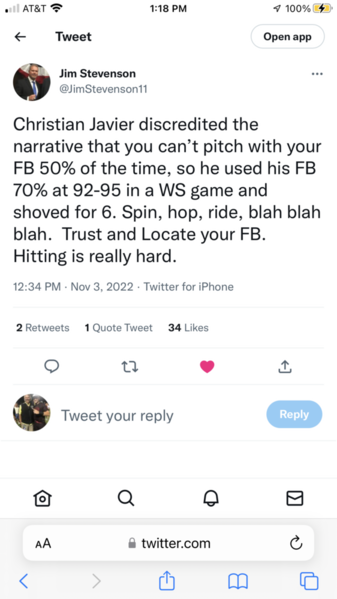@NJ2025Dad, my comments are not solely directed at you. But if the shoe fits….. My perspective is a little different than a lot of HSBBW members and I occasionally say things that are contrary to popular opinion. And that’s why I say them. In hopes that someone hears it. My baseball journey with my sons is over but I’m still very involved in the game. I attend showcase events regularly looking for players to recruit. When I’m there I always network with coaches. And I’m telling you what we see way too much of. Which is kids and parents that have emphasized metrics over learning how to play the game. Then they wonder why they aren’t being recruited. From the perspective of the schools you want recruiting you this is a real issue. Especially with position players. Not as much with pitchers. When the RC of a school says, “we would recruit you if your 60 time was under 7.0”, he is likely not telling the truth. He is passing on you by using a number you can’t argue with. Metrics have always been part of baseball. The showcase model today is exactly the same as pro tryouts were in the 70’s. So metrics are important - to a point. But they do not guarantee in game performance. And today’s players are more likely than ever before to post good numbers and not be very good in games. So for the majority of players that are trying to get noticed, here is the message. If you want to stand out be a really good player in games. Hustle, run hard, take the extra base, be a leader, run the bases well, know where to throw the ball, hit your cutoff man, understand situational hitting, etc. Play good fundamental baseball and play hard. If you do this at the HS level you will stand out.
"If you want to stand out be a really good player in games. Hustle, run hard, take the extra base, be a leader, run the bases well, know where to throw the ball, hit your cutoff man, understand situational hitting, etc. Play good fundamental baseball and play hard. If you do this at the HS level you will stand out."
That general message is a great one. It's certainly one that I believe in.
I just want to add one more thought to this thread, so that I clarify what this discussion started as. I didn't intend my OP to be a debate of what a kid should be focused on in trying to be a better baseball player. Not sure if it sounded that way, but it wasn't my intent. My OP was simply discussing the correlation of body weight to exit velocity. Understanding that correlation can be used for a number of purposes.
As I've mentioned before, I think that metrics, if used in the right way, can be a valuable training tool. One of the purposes of understanding the body weight to exit velocity correlation could be to simply reassure a kid that his exit velocity is just where it's supposed to be. Like it or not, most kids who are serious about baseball see their exit velocities at least occasionally, and they compare it to their peers.
I get your point that you don't want kids to be preoccupied with their exit velocity and metrics. Maybe this correlation helps that happen by helping them understand that exit velocity isn't some mysterious thing. It will just come to them as they get bigger and stronger, and they can focus on all of the things you mention.


